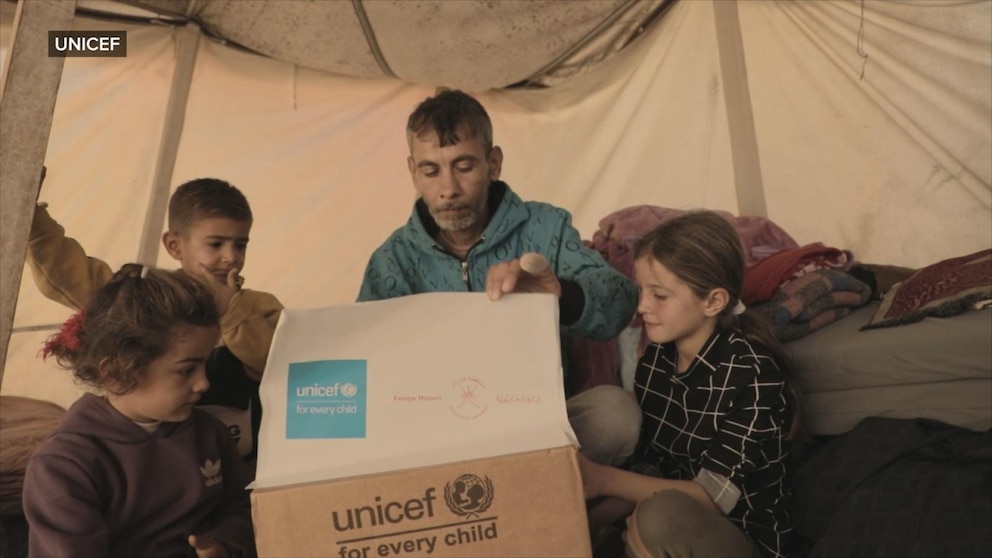UNICEF Warns of Catastrophe in Gaza City,
UNICEF has issued an urgent warning that Gaza City is facing a humanitarian catastrophe, with famine and the collapse of essential services threatening the survival of nearly a million residents, especially children.

The United Nations Children’s Fund (UNICEF) has sounded the alarm over what it describes as an unfolding humanitarian catastrophe in Gaza City, where intensified Israeli military operations and a blockade have left nearly a million residents, most of them displaced, on the brink of survival. UNICEF officials report that the city, once a vibrant urban center, is now marked by fear, flight, and funerals, with essential services collapsing and famine spreading rapidly among the population.
Tess Ingram, UNICEF’s Communication Manager for the Middle East and North Africa, recently spent nine days in Gaza City and described the situation as dire: “The last refuge for families in the northern Gaza Strip is fast becoming a place where childhood cannot survive.” She recounted meeting children separated from their parents, mothers grieving lost children, and infants fighting for life in overcrowded hospital incubators. Ingram emphasized, “The unthinkable is not looming. It is already here. The escalation is underway.”
Famine and Health System Collapse
Malnutrition and famine have become widespread, with UNICEF estimating that more than one million children are malnourished and 40,000 infants are at risk of dying. Hospitals are overwhelmed, operating at double or triple capacity, and only a fraction of nutrition treatment centers remain functional. The World Health Organization (WHO) has delivered formula and nutritional supplies, but officials warn these efforts are insufficient given the scale of the crisis. WHO Director-General Tedros Adhanom Ghebreyesus stated, “We continue to call for scaled-up, sustained, and safe access to food and medicines into Gaza. The best medicine is peace.”
The city’s infrastructure has been devastated by ongoing bombardment, with neighborhoods flattened and families forced to shelter in rubble or makeshift tents. Water systems have collapsed, and disease is spreading rapidly due to overcrowding and lack of sanitation. According to medical sources, at least 370 people—131 of them children—have already starved to death. Aid groups warn that any further intensification of military operations will push civilians beyond the edge of survival.
Obstacles to Aid and International Response
Humanitarian aid delivery faces chronic obstacles. The UN Office for the Coordination of Humanitarian Affairs (OCHA) reports that while some food aid is entering Gaza, much of it is intercepted by desperate crowds or looted by organized groups before reaching those most in need. Less than 40 percent of the daily required food supplies are making it into the Strip, and only two percent of aid reaches designated warehouses. Daily, civilians are killed or injured either by military action or violence erupting among crowds vying for scarce resources.
International courts have begun to scrutinize the crisis: the International Criminal Court has issued arrest warrants for Israeli leaders, and the International Court of Justice is considering genocide charges against Israel. Despite mounting global warnings, the death toll continues to rise, with at least 46 Palestinians killed in Israeli strikes across the enclave on Thursday alone.
Propaganda and Narrative Distortion
Reporting from independent sources in democratic countries highlights the deliberate targeting of civilian infrastructure and the systematic obstacles to aid delivery. Official statements from Israeli authorities often frame military actions as necessary security measures, but independent humanitarian agencies and journalists document the devastating impact on civilians, especially children. Emotional appeals and selective statistics are frequently used in official narratives from both sides, but the overwhelming consensus among international humanitarian organizations is that the crisis in Gaza City is man-made and preventable.
As the situation deteriorates, UNICEF and other agencies continue to call for urgent international intervention to prevent further catastrophe and to ensure the protection and survival of Gaza’s children.